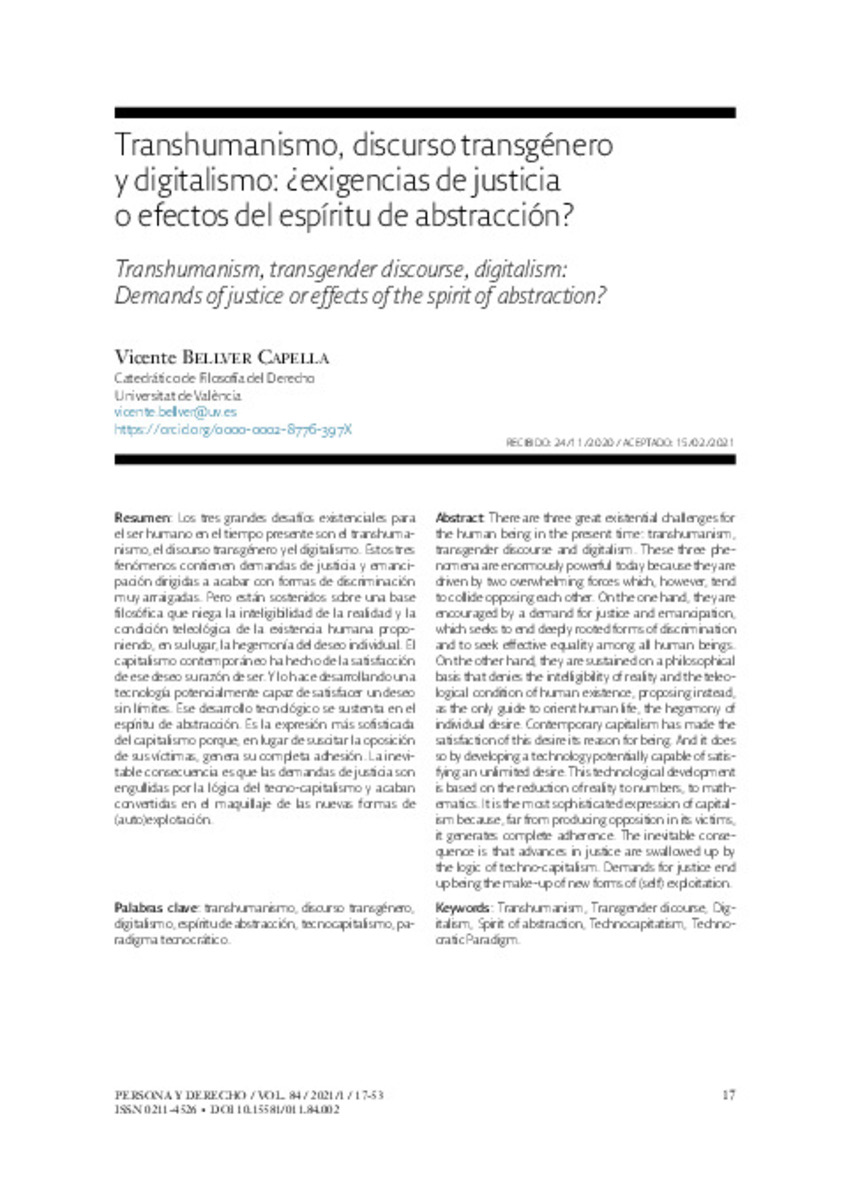Full metadata record
| DC Field | Value | Language |
|---|---|---|
| dc.creator | Bellver-Capella, V. (Vicente) | - |
| dc.date.accessioned | 2021-06-17 | - |
| dc.date.accessioned | 2022-08-30T06:12:46Z | - |
| dc.date.available | 2022-08-30T06:12:46Z | - |
| dc.date.issued | 2021 | - |
| dc.identifier.citation | Bellver-Capella, V. (Vicente). "Transhumanismo, discurso transgénero y digitalismo: ¿exigencias de justicia o efectos del espíritu de abstracción?". Persona y Derecho. (84), 2021, 17 - 53 | es |
| dc.identifier.issn | 0211-4526 | - |
| dc.identifier.uri | https://hdl.handle.net/10171/64132 | - |
| dc.description.abstract | There are three great existential challenges for the human being in the present time: transhumanism, transgender discourse and digitalism. These three phenomena are enormously powerful today because they are driven by two overwhelming forces which, however, tend to collide opposing each other. On the one hand, they are encouraged by a demand for justice and emancipation, which seeks to end deeply rooted forms of discrimination and to seek effective equality among all human beings. On the other hand, they are sustained on a philosophical basis that denies the intelligibility of reality and the teleological condition of human existence, proposing instead, as the only guide to orient human life, the hegemony of individual desire. Contemporary capitalism has made the satisfaction of this desire its reason for being. And it does so by developing a technology potentially capable of satisfying an unlimited desire. This technological development is based on the reduction of reality to numbers, to mathematics. It is the most sophisticated expression of capitalism because, far from producing opposition in its victims, it generates complete adherence. The inevitable consequence is that advances in justice are swallowed up by the logic of techno-capitalism. Demands for justice end up being the make-up of new forms of (self) exploitation. | en_US |
| dc.description.abstract | Los tres grandes desafíos existenciales para el ser humano en el tiempo presente son el transhumanismo, el discurso transgénero y el digitalismo. Estos tres fenómenos contienen demandas de justicia y emancipación dirigidas a acabar con formas de discriminación muy arraigadas. Pero están sostenidos sobre una base filosófica que niega la inteligibilidad de la realidad y la condición teleológica de la existencia humana proponiendo, en su lugar, la hegemonía del deseo individual. El capitalismo contemporáneo ha hecho de la satisfacción de ese deseo su razón de ser. Y lo hace desarrollando una tecnología potencialmente capaz de satisfacer un deseo sin límites. Ese desarrollo tecnológico se sustenta en el espíritu de abstracción. Es la expresión más sofisticada del capitalismo porque, en lugar de suscitar la oposición de sus víctimas, genera su completa adhesión. La inevitable consecuencia es que las demandas de justicia son engullidas por la lógica del tecno-capitalismo y acaban convertidas en el maquillaje de las nuevas formas de (auto)explotación. | es_ES |
| dc.language.iso | spa | - |
| dc.publisher | Servicio de Publicaciones de la Universidad de Navarra | es_ES |
| dc.rights | info:eu-repo/semantics/openAccess | es_ES |
| dc.subject | transhumanismo | - |
| dc.subject | discurso transgénero | - |
| dc.subject | digitalismo | - |
| dc.subject | espíritu de abstracción | - |
| dc.subject | tecnocapitalismo | - |
| dc.subject | paradigma tecnocrático | - |
| dc.title | Transhumanismo, discurso transgénero y digitalismo: ¿exigencias de justicia o efectos del espíritu de abstracción? | es_ES |
| dc.title.alternative | Transhumanism, transgender discourse, digitalism: Demands of justice or effects of the spirit of abstraction? | en_US |
| dc.type | info:eu-repo/semantics/article | es_ES |
| dc.identifier.doi | 10.15581/011.84.002 | - |
| dadun.citation.endingPage | 53 | - |
| dadun.citation.number | 84 | - |
| dadun.citation.publicationName | Persona y Derecho | - |
| dadun.citation.startingPage | 17 | - |
Files in This Item:
Statistics and impact
Items in Dadun are protected by copyright, with all rights reserved, unless otherwise indicated.






